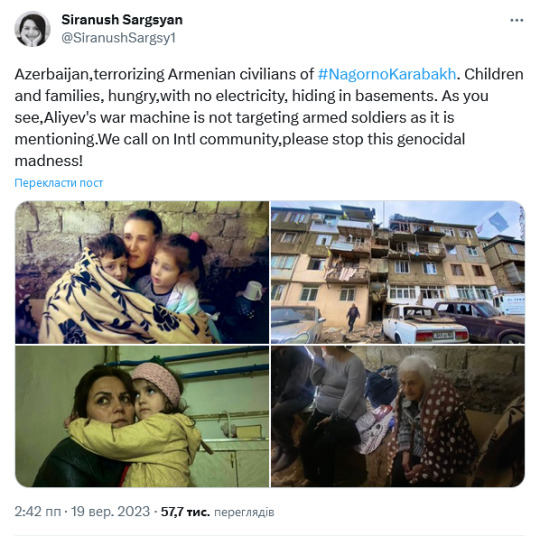#Nagorno Karabakh war
Text
💥Explosions Rock Stepanakert as Azerbaijan Launches an Offensive Against Armenia into the Disputed Nagorno-Karabakh Region 💥
Residents of Stepanakert in the heavily disputed Nagorno-Karabakh Region of what is internationally recognized as Azeri territory, awoke to sounds of explosions and gunfire ripping through the city Tuesday morning as Azeri Forces launched what it calls an Anti-Terrorist Operation into the region.
The Nagorno-Karabakh territory has been in dispute ever since the collapse of the Russian Empire after the October Revolution in 1917. The disputed territory was mostly de-escalated during the Soviet era, with Nagorno-Karabakh given the status of Autonomous Oblast within the Azerbaijan SSR, giving it a measure of self-governance.
However, since the collapse of the USSR, the ethnic dispute has flared back up with two major wars fought over the Nagorno-Karabakh territory since 1988.
The first Nagorno-Karabakh War lasted from February 1988 until May 1994. While the Second Nagorno-Karabakh War in 2020 lasted for 44 days.
Armenian Prime Minister Nikol Pashinyan has been positioning himself to join the Western Bloc, taking an interest in joining the EU and NATO with US encouragement.
However, it is understood that NATO will not allow Armenia to join the Military Bloc as long as the risk of war breaking out in Nagorno-Karabakh remains high.
With this in mind, some analysts believe Armenia has been quietly instigating an Azeri incursion into the area with the idea of letting Nagorno-Karabakh fall completely under Azerbaijani control, relinquishing the territory and easing the associated tensions that might give NATO pause before admitting Armenia into the alliance.
Interestingly, Pashinyan accepted Azerbaijani sovereignty over Nagorno-Karabakh back in May, undermining its own negotiating position and upsetting the balance of power in the region. However, the population of the Nagorno-Karabakh territory is majority Armenian, and local authorities do not recognize Azeri sovereignty over the area.
Azerbaijan has warned Armenia against involving itself with NATO, suggesting it will lead to conflict in the region, and few of Armenia's neighbors are happy with the moves. However, Armenia has ignored the warnings, going so far as to host US Forces in the country for Military exercises which began on September 11th, 2023.
Many Russian analysts, media personalities and politicians see this as a major provocation and an attempt to open a new front in the Ukraine War as Russian peacekeepers had been tasked with maintaining the Status-Quo as per agreement between the two warring sides at the end of the second Nagorno-Karabakh War. Western analysts dispute this claim.
We will keep you updated as information comes in.
UPDATE: sources say there have been 5 deaths and at least 80 casualties reported so far in the ongoing Azerbaijan Operation in Nagorno-Karabakh.
#nagorno karabakh#Stepanakert#armenia#azerbaijan#world news#global news#international news#internationalism#international politics#international affairs#Nagorno Karabakh war#war#war news#socialism#communism#marxism leninism#socialist politics#socialist news#socialist worker#western imperialism#socialist#communist#marxism#marxist leninist#politics#news#workersolidarity#worker solidarity#nato#eastern europe
13 notes
·
View notes
Text
oh, i cannot read the news without tears. my mother was forced to flee from karabakh when she was just fifteen. in a foreign land, without knowing the language, they mocked her for her poor accent, for her old, shabby clothes, for her poverty. her sorrow became a subject of ridicule. but she had no opportunity to receive an education and learn a new language because she was preoccupied with survival.
my mother had to care for her sick father and younger brother, help her mother find any kind of work. she would pick apples and sell them at the market. my mother would rise at five in the morning and labor tirelessly for years until the family managed to find their footing. she would alter old clothes when they became too short. my mother could go hungry for days so that her family could have something.
meanwhile, life went on around her. her peers dressed beautifully, went to dances, savored their youth. my mother had to swallow her pride to avoid losing her mind and fading away.
now she's over forty, she has her own family, but the pain still lingers. she is still frightened by the sounds of thunder, for they so closely resemble the sounds of gunfire. she shares stories from her childhood with bitterness, for in one day she had to grow up forever because of a bunch of bloodthirsty murderers. and now the story repeats itself. inside my mother, the child from karabakh is frightened once again.
my heart aches for all the families who were forced to leave their homes, who lost their loved ones, who became victims of someone else's play at being gods.
i pray for the enlightenment of minds. may the thirst for blood and power finally cease.
185 notes
·
View notes
Text
the most painful thing about artsakh to me is that my relatives had to emigrate from there in 1991, so it was 32 years ago. And today, once again, azerbaijan started shelling artsakh, while armenians in artsakh have been under blockade since december 2022
so. 32 years has passed and there's still war. this thought makes me want to cry. god, i wish people will learn to live in peace someday
#armenia#azerbaidjan#war#stop war#nagorno karabakh#artsakh#armenian genocide#news#politics#nagorny karabakh
131 notes
·
View notes
Text

Stop occupation, stop new Armenian genocide! 🛑
Pls, maximum repost
#armenia#azerbaïdjan#war#ukraine#Russia#stop war#nagorno karabakh#artsakh#armenian genocide#news#tumblr#USA
140 notes
·
View notes
Text
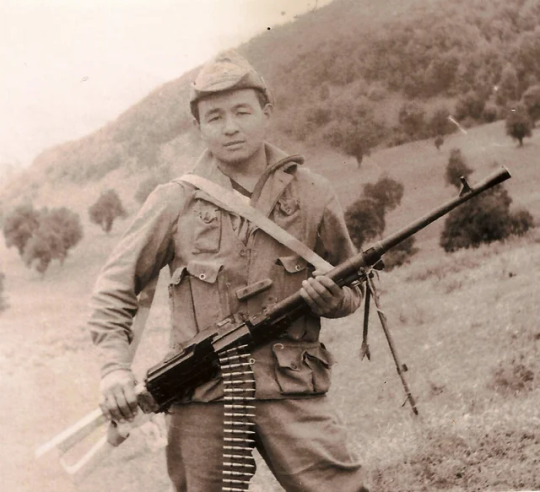
Ethnic Kazakh volunteer with a PKT machine gun modified for infantry use in the Armenian side during the First Nagorno-Karabakh War.
26 notes
·
View notes
Text
when people say "use your privilege" they don't mean use your privilege of distance to not speak on situations.
I'm seeing so many blogs not talk about the current attempts of Palestinian genocide (probably because they want to "keep their blog aesthetic") and I'm seeing barely anyone talk about the world wide rise in antisemitism or the current Armenian genocide
But I guess all that means for you is that pretty soon you might have to pretend to care about another ethnic group being wiped out* - must be hard /s
*until it stops being trendy...
BLM
StopAsianhate
Missing And Murdered Indigenous Women
Stand With Ukraine
Yemen
Iraq
Syria
#free palestine#hamas is isis#antisemitism#nagorno karabakh#armenian genocide#israel#hamas massacre#alestinian genocide#gaza strip#ukraine#stand with ukraine#iraq war#iraq invasion#syria#yemen war#yemen#syrian refugees#palestinian genocide#antisemitsm tw
35 notes
·
View notes
Photo
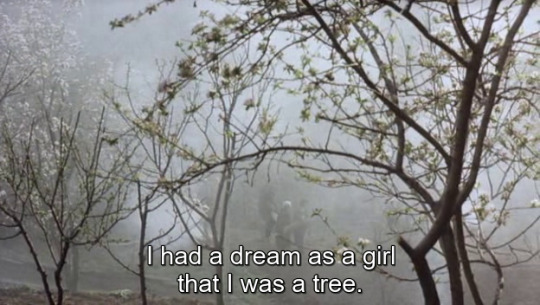
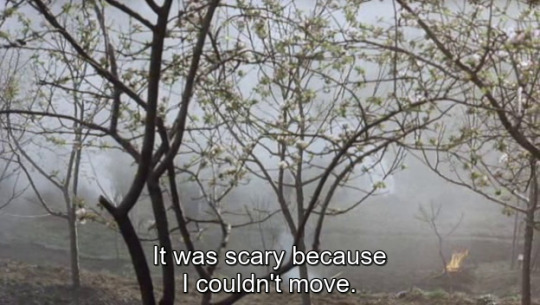
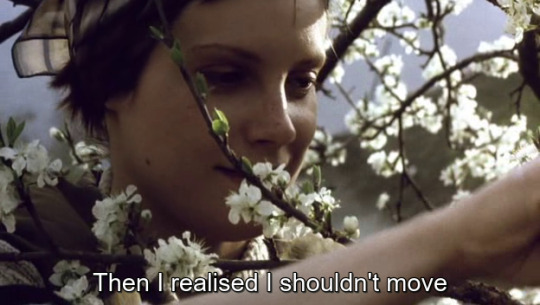

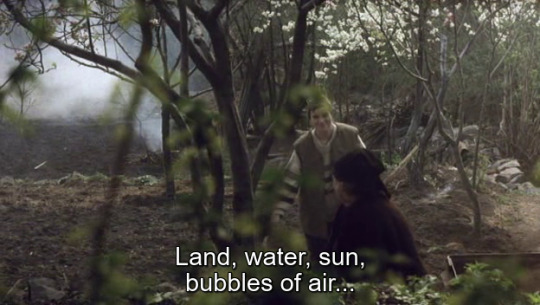

Маяк [The Lighthouse] (Mariya Saakyan, 2006)
#Маяк#The Lighthouse#Mariya Saakyan#Armenia#wartime#Anna Kapaleva#Հայաստան#Hayastan#drama film#1990s#First Nagorno-Karabakh War#Caucasus#2000s movies#life#disintegration of the U.S.S.R.#family#hope#Sofiko Chiaureli#Լեռնային Ղարաբաղ#South Caucasus#Russian movies#love#Наго́рный Караба́х#homeland#Sos Sargsyan#Soviet collapse#European cinema#Mayak#Armenian cinema#dreams
8 notes
·
View notes
Text
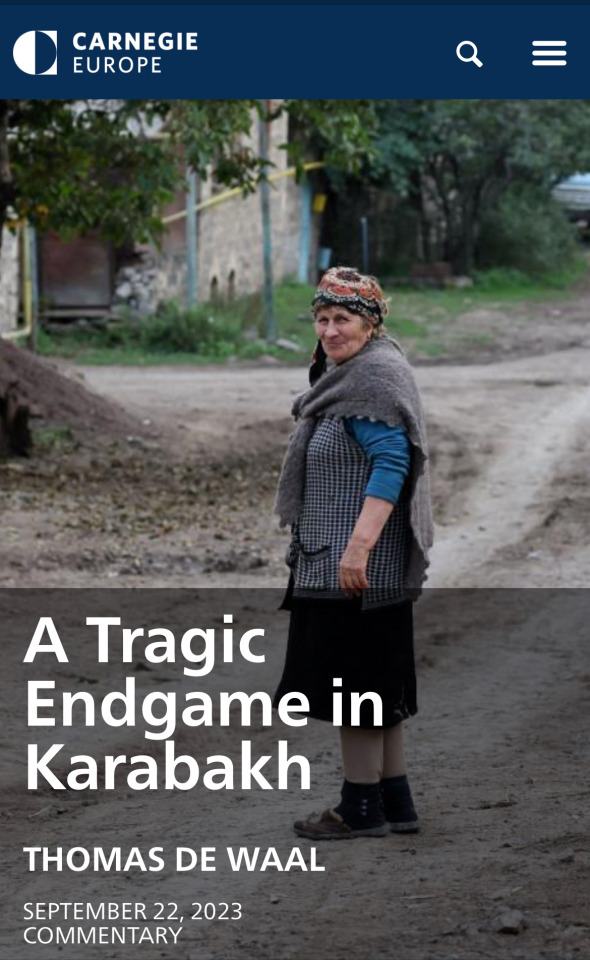
“Force, not diplomacy, has decided the course of this conflict since it first flared up during the era of former Soviet president Mikhail Gorbachev. (Some would say it originated well before, in the early twentieth century.) In 1988, the Karabakhi Armenians tried to break away from Soviet Azerbaijan and join Soviet Armenia in a dispute that developed into armed conflict. In the 1990s, the Armenians prevailed on the battlefield, occupying large parts of Azerbaijani territory and driving hundreds of thousands of inhabitants from their homes. In 2020, the Azerbaijanis reversed the situation, recapturing their lost territories and taking parts of Karabakh, too.
(…)
Diplomacy resumed, with the European Union, the United States, and Russia all negotiating between Armenia and Azerbaijan. The competing mediators made progress on bilateral issues, but the Karabakh issue remained unresolved. Armenian Prime Minister Nikol Pashinyan agreed, along with the rest of the world, to recognize Azerbaijan’s territorial integrity (including Nagorny Karabakh), but the vital question of the inhabitants’ rights and security remained unresolved.
The Karabakhis’ fate was probably sealed in April, when Azerbaijan established a checkpoint on the Lachin Corridor. This de facto blockade deepened in the summer, and the situation became desperate for tens of thousands of people remaining in Karabakh (estimates range from 50,000 to 120,000) who began to run out of food and medicine.
There is a geopolitical game here. A small Russian peacekeeping force was established in Karabakh in 2020. Moscow, which has always wavered between and manipulated both sides, had presented itself as the protector of the Karabakhis. President Vladimir Putin publicly told them his peacekeepers would guarantee their safe return from Armenia and continued residence in their homeland. But the Russian soldiers stood by as the checkpoint was set up on the Lachin road earlier this year, fracturing trust held in the peacekeeping force.
The context is that after Russia invaded Ukraine, the Armenian government began to pivot toward the West, and Azerbaijan—with which Russia shares a land border and an authoritarian model of government—looked like a more valuable partner.
(…)
The military offensive on September 19 caught Western officials by surprise, which became more understandable when news broke that Russian peacekeepers simply stood down and let the assault happen. The impression that there had been a side deal between Moscow and Baku deepened when Russian officials blamed Pashinyan and his pro-Western tendencies, not Azerbaijan, for the fighting.
(…)
In the darker European order of the past decade, where normative values and a multilateral framework have been devalued, Azerbaijan cares less about statements of condemnation from Western governments. The key thing is almost certainly the support of two regional powers and neighbors: the full backing of Türkiye and deliberate equivocation from Russia, which looks more concerned about keeping its military base on the ground in Azerbaijan and humiliating the government in Yerevan than in ensuring the rights of local Karabakh Armenians.”
“Armenian separatists in Nagorno-Karabakh agreed Wednesday to disarm and discuss reintegration with Azerbaijan following a swift but deadly assault by Azerbaijani forces, a capitulation that signals the end of decades of ethnic-Armenian rule in the enclave and the rapid decline of Russian influence in the former Soviet Union territories.
The terms of the cease-fire lay groundwork that could bring to a close the autonomous rule by the population of Nagorno-Karabakh, which was won from Baku in a bloody yearslong war after the fall of the Soviet empire.
(…)
“Russia’s leverage is much weakened by what’s happening in Ukraine. We see the Armenians moving away from Russia and Azerbaijan having a relationship with Russia that is more on its own terms,” said Thomas de Waal, an expert on Nagorno-Karabakh and senior fellow at Carnegie Europe, a Brussels-based think tank.
(…)
Azerbaijan says it plans to take back the enclave—which sits inside its borders but is populated almost entirely by ethnic Armenians who have ruled since the 1990s under the terms of a peace deal brokered by Russia. Skirmishes in the years since erupted into conflict in 2020 when Azerbaijan reclaimed areas around the territory. That battle ended, again with Russian arbitration, guaranteeing Armenian separatists control over Stepanakert and supply routes from Armenia, policed by Moscow’s troops. But peace has remained shaky with Armenia’s leaders complaining that Russia is no longer able to enforce the deal, distracted by its war in Ukraine.
A senior Azeri official said Baku had advanced on the enclave while Russia’s troops and arms are tied up in Ukraine. Baku had told Russia about its intentions ahead of time, the official said, but Moscow failed to act in part because it seeks regime change in Armenia. Armenian Prime Minister Nikol Pashinyan has increasingly criticized Russia’s capabilities as a guarantor of security and worked to forge stronger links with the West.
(…)
Russia, which still has a military base inside Armenia, has seen its influence steadily wane in the South Caucasus, a territory crisscrossed by oil-and-gas pipelines where the U.S., Turkey and Iran all vie for influence. Earlier this month, U.S. forces began joint military exercises that saw 175 Armenian soldiers training for 10 days with about 85 soldiers from U.S. Army Europe and Africa Command outside the Armenian capital of Yerevan.
(…)
The Azeri offensive is the culmination of a nearly yearlong effort to cut Nagorno-Karabakh’s links to Armenia through a de facto blockade that has led to shortages in food, fuel and medicine. In recent weeks, Azerbaijan gathered its forces around Nagorno-Karabakh.
(…)
Azerbaijan’s moves to weaken the enclave violated the terms of the 2020 cease-fire clinched by Russia, and Russian peacekeepers’ inability to prevent them caused Pashinyan to repeatedly criticize Moscow’s role as a guarantor of stability while it is bogged down in its invasion of Ukraine.
The criticism has caused a chill in Russian-Armenian relations and Moscow has broadcast scenes of protesters demonstrating outside Pashinyan’s office in central Yerevan this week. Russian President Vladimir Putin said Wednesday that his country’s peacekeepers were working in the region, and Russian commentators have placed blame for Nagorno-Karabakh’s capitulation squarely on Pashinyan’s shoulders.
Analysts say that Moscow is now looking to capitalize on any weakness in Pashinyan’s government in the hopes that one of the opposition parties, which it works with more closely, could come to power as a result of rising disapproval among Armenians over the integration of Nagorno-Karabakh into Azerbaijan.”
“Officially, the 1,700-square-mile territory is part of Azerbaijan and is known by its Russian name, which translates to “mountainous Karabakh.” But to Armenians and the Armenian-majority population of the region, it’s known as the Nagorno-Karabakh Republic, a de facto independent state that has been outside of Azeri rule since 1988.
For centuries, Muslim Azerbaijanis and Christian Armenians, both of whom call the region home, clashed over who should control it. Russian rule began in 1823, and when the Russian Empire dissolved in 1918, tensions between newly independent Armenia and Azerbaijan reignited. Three years later, Communist-controlled Russia set its sights on the independent states of the Caucasus region and began incorporating them into what would become the Union of Soviet Socialist Republics.
At first, it was decided that Karabakh would be part of the Armenian Soviet Socialist Republic (S.S.R.). Though historians differ on the reasons, the initial incorporation of Karabakh into Armenia is thought to have been a plan to ensure Armenian support of Soviet rule. But the Soviets’ new Commissar of Nationalities, Joseph Stalin, reversed the decision. In 1923 Nagorno-Karabakh became an autonomous administrative region of the Azerbaijan S.S.R., even though 94 percent of its population at the time was ethnic Armenian.
(…)
As the Soviet Union disintegrated in the late 1980s, the long-dissatisfied ethnic Armenians of Nagorno-Karabakh petitioned to become part of the Republic of Armenia. Azerbaijan responded by trying to crush the separatists in 1988, and clashes intensified in the region. In 1991, both Azerbaijan and Armenia declared independence from the U.S.S.R., and the regional clashes in Nagorno-Karabakh flared into full-out war.
As a result, more than a million people became refugees, and around 30,000 people, including civilians, were killed. Both sides engaged in ethnic cleansing during the Nagorno-Karabakh War—the Azerbaijanis against ethnic Armenians, and Armenian forces against ethnic Azeris. Despite the brutal humanitarian toll, negotiations between the sides repeatedly broke down.
In 1994, the newly independent nations of Armenia and Azerbaijan signed the Bishkek Protocol, a ceasefire brokered by Russia that left Nagorno-Karabakh in Azerbaijan. But though the fighting ceased, the two sides could not agree on a peace treaty.
For the last two and a half decades, Armenian and Azerbaijani troops have been divided by a contested “line of contact” laid out in the Bishkek Protocol. It has become increasingly militarized over the years, and has been called one of the world’s three most militarized borders. The Council on Foreign Relations says that given the close positioning and limited communication between military forces stationed there, “there is a high risk that inadvertent military action could lead to an escalation in the conflict.”
That’s of even greater importance because of the conflicted nations’ powerful allies. Azerbaijan is supported by NATO member Turkey, while Russia supports Armenia, making the area a potential conflagration zone. While Nagorno-Karabakh is small, the geopolitical stakes are high due to its proximity to strategic oil and gas pipelines, and its location between the powerful regional forces of Russia, Turkey, and Iran.”
21 notes
·
View notes
Text
#here’s a thing#people are strange this generation or these days#the first thing I can think of making Israel stop bombing Palestinians is to send not just peace keeping troops but to send#sizable ground forces to help Israel eradicate hamas#the same to end war in ukraine#not just a few thousands but at least a hundred thousand per each country like canada or United States.#this is trivial.#nobody has business in telling Israel to stop unless that#otherwise it’s like russia’s do nothing peace keeping forces in kahrabha#nagorno karabakh#the world obviously does not have the stomach to seriously do something but talk nonsense#taiwantalk#Gaza#West bank#and not just to eradicate Hamas but to do Palestinian solid by governing the place for a few decades
7 notes
·
View notes
Text
💥Republic of Artsakh Authorities Agree to Ceasefire💥
Republic of Artsakh Authorities in the breakaway Nagorno-Karabakh territory agreed to a Russian-proposed ceasefire one day after Azeri Forces launched an assault on the Nagorno-Karabakh region and demanded Armenian Militants defending the unrecognized Republic surrender to Azeri Forces.
Armenian Prime Minister Nikol Pashinyan refused to defend the Armenian exclave, insisting yesterday that Armenia did not have any troops located in the Nagorno-Karabakh territory and told audiences that Armenian authorities would not be defending the Republic of Artsakh as it lies within another country's territory.
Thousands of Armenian protesters began demonstrations in the Capitol city of Yerevan last night, demanding Pashinyan defend the exclave or insist he step down. Demonstrators expressed their discontent with what they see as Nikol Pashinyan and his administration's unwillingness to defend Armenians and Armenian interests within the Republic of Artsakh and the greater Nagorno-Karabakh region, protesting what they saw as capitulation to Azerbaijan by Armenian authorities.
Protestors also expressed their anger with the Russian Peacekeepers who were unable to stem the violence, as well Western countries for refusing to get involved.
According to Russia's TASS News Agency, the Russian MoD announced their Peacekeeping Forces in the region had proposed and found agreement on a Ceasefire which will be implemented in coordination between Russian Peacekeeping Forces, Azeri Authorities, and Republic of Artsakh Militias.
Armenian Prime Minister Nikol Pashinyan, however, told local media that Armenian authorities were not party to the agreement, nor were they involved in its drafting.
"Armenia did not participate in drafting the text of the ceasefire declaration in Nagorno-Karabakh under the mediation of Russian Peacekeepers." Pashinyan said. Yerevan "does not have an army" in the Separatist-controlled area.
Since the Azeri Offensive was launched yesterday morning, at least 32 people have been killed and more than 200 injured.
#nagorno karabakh#nagornokarabakh#nagorno-karabakh#Nagorno Karabakh war#war news#international affairs#international news#global news#world news#socialism#communism#marxism leninism#socialist politics#socialist news#socialist revolution#socialist worker#workersolidarity#worker solidarity#socialist#communist#marxism#marxist leninist#armenia#azerbaijan#armenia news#Azerbaijan news#news#geopolitics#ceasefire#nagorno karabakh ceasefire
3 notes
·
View notes
Text
“Don’t Start None, Won’t Be None” (OLD ESSAY)
This essay was originally posted on November 22nd, 2020 (at the tail end of the Second Nagorno-Karabakh War between Azerbaijan and Armenia).
I think this is where I started to find my footing and what I was about more in terms of my ideology and approach to war and conflict and peace and probably the earliest essay I'm still kinda proud of. This is where the birth of the "Don't Start None, Won't Be None"/"Fuck Around and Find out"/ Doctrine emerged.
(Full essay below the cut).
“Some people seem confused by my posts recently. Just because I’m anti war does not mean I’m a pacifist.”
That is what Joe Kassabian – author of both fiction and non-fiction and the host of “Lions Led by Donkeys”, one of my favorite podcasts and a gateway that led me to leftism – tweeted out a day after war erupted between Armenia and Azerbaijan.
The reason that some of the listeners of Joe’s podcast and readers of his books might have been confused or upset was obvious if you know anything about him. After all, as long as I have been consuming Joe’s content, he has made his views on war pretty obvious: he’s against it. I could think of more than a handful of episodes of his podcast where he and his cohost Nick had very clearly stated that military blunders like the ones they examined throughout history can simply be avoided if you “don’t go to war” and “don’t invade people.” This was given further weight by their combined military service, which included time spent in Afghanistan for Joe.
However, the recent war in the South Caucasus has a personal dimension for Joe as an Armenian-American. The conflict and long going disputes between Armenia and Azerbaijan center on territory known as Artsakh or Nagorno-Karabakh. Though internationally recognized as a territory of Azerbaijan, Artsakh is both historically and overwhelmingly ethnically-Armenian and only became part of Azerbaijan under the former-Soviet Union, when the Soviet government created Nagorno-Karabakh as an autonomous region within Azerbaijan in 1920. Artsakh itself has been nominally independent – though officially unrecognized – since after the last full-scale war between Armenia and Azerbaijan following the collapse of the Soviet Union in 1991, a bloody conflict was halted by a cease-fire in 1994.
Since the last war, both countries have engaged in a prolonged, low-level struggle with one another over Artsakh, with occasional flare ups. But on September 27, 2020, the conflict escalated back into a fully blown conventional war as Azerbaijan’s military launched attacks with armor, artillery and airpower in an attempt to seize Artsakh. They have done so with the full political and military support of Turkey – which committed the infamous and horrific 1915 genocide against the Armenian people.
The escalating conflict has quickly brought with it violence and suffering for the civilians of not only Armenia and Artsakh – which have been directly targeted – but also for the citizens of Azerbaijan, caught in the crossfire and victims of collateral damage. There have also been reports of Azerbaijani war crimes against Armenian POWs. As of November 10th, a contentious peace agreement brokered by Russia has taken effect that heavily favors Azerbaijan and has garnered mass opposition in Armenia, ending this most recent conflict between the two states in a way that virtually guarantees renewed fighting between them both in the future.
With all this in mind, it is understandable why Joe would strongly support both Artsakh and Armenia proper in defending themselves from Azerbaijani and Turkish aggression. However, clearly enough people were confused or upset by Joe’s words and actions that he felt like he had to make the tweet I referenced at the onset of this essay to clarify his feelings. That gets to the heart of an issue that I’ve seen a fair amount in the relatively short time since I first delved into the world of leftism, when it comes to war and international relations: a misconception of what it really means to be “anti-war.”
Being Anti-War vs. Being Pacifist
On the surface being “anti-war” seems like it should be very simple: you are against war. That’s certainly what the Merriam-Webster dictionary definition gets across when it defines the term as being “opposed to war” (yes, I’m actually pulling the high school book report move of referring to the dictionary definition of a word; deal with it, internet). The gist of that definition certainly seems to be the point I’ve seen articulated by any anti-war protest or protestor I’ve ever seen – either in person or through second-hand accounts in the media.
That being said, an important distinction needs to be made between being opposed to something and refusing to participate in it. In this case, I mean the difference between being anti-war and pacifist – a distinction that feels like it gets muddled when it comes to anti-war activism. This is the distinction I that I believe that people who were confused by Joe’s vocal support of Armenia were not making.
While being anti-war means generally being opposed to war, being pacifist is specifically defined as “refusal to bear arms on moral or religious grounds” (yes I did it again; die mad about it; word choice and definitions matter). The distinction here is important because while being pacifist rules out participation in war altogether – even if it is forced upon you – being anti-war does not. Being opposed to an activity does not necessitate a refusal to engage in an activity, especially if your well-being and the well-being of others depends on it.
I offer up an extremely simplified example: I am generally opposed to punching someone in the face (except if they’re a Nazi; in which case, you should feel free to liberate their teeth from their fashy head). That being said, if I was suddenly attacked by some rando on the street – or a good friend or family member of mine was attacked in the same situation and I was standing right next to them – you’d better believe I’d fight back with anything and everything I had at my disposal until the assailant was no longer a threat to me or whoever I was with who had been attacked.
The logic of that example translates to war. Like Joe, I consider myself to be anti-war – despite my lifelong study of it and fascination with it as a phenomenon. But that does not mean I think that you should never fight a war under any circumstances, even if you are the one being attacked by an aggressor. I’m no pacifist – as the above example probably made crystal clear.
On the contrary, I believe that a country that is the victim of aggression has every right to defend itself – just like the victim of a random attack would in my hypothetical example. You could go even further to say that a country has an obligation to defend its people from aggression – especially in the face of mass destruction and possible genocide. Moreover, I’d argue that in the spirit of international solidarity, if an allied or innocent country is the victim of aggression, any leftist state has a duty to come to that ally’s aid and help to defend them and their people until the aggressor is no longer in a position to do them any harm. In my eyes, this is the only major reason a leftist government would to go to war: to defend yourself or an ally against attacks by an aggressor (another time we can get into the nuance of lesser included cases such as going to war to prevent genocide or to enforce or keep the peace – something definitely relevant to cases like Armenia’s as well).
This is certainly not a new idea. In the aftermath of World War I, the signatories to the Kellogg-Briand Pact of 1928 all renounced war as an instrument of policy – though reserving the right to war in the case of self-defense. Likewise, the United Nations Charter prohibits its members from the use of force to resolve conflicts between one another, but still allows them the right to self-defense if attacked by an aggressor. Naturally, these documents have failed to stop aggression altogether, but the point here is that the idea of being anti-war but reserving the right to defend oneself against an aggressor is an established and realistic one. You can’t count on everyone else to play by the same rules. There are always going to be those with malicious intent and the ability to act upon that intent.
The “Don’t Start None, Won’t Be None” Doctrine
All this connects back to one of the main points I made in the first essay for this site and one of the main reasons why I started writing these essays in the first place. Even if your country were to turn completely leftist overnight, you simply cannot count on ever other place in the world to do the same simultaneously, nor can you count on them to respect that change.
While some might like to imagine a sudden and complete globe-spanning revolution turning the planet into a fully-automated Star Trek-style space communist paradise in short order, the reality is that will almost certainly never happen (though it’s fun to think about, I won’t lie). The reality is that if any kind of leftist administration is ever achieved in the United States, we would have to deal with an international order based around states and governments. Within that order there would be more than a handful of states that would disagree with our governing principles, as well as with some that might actively wish us and anyone aligned with us harm.
This doesn’t mean that we should be doing more of the same as we have under past administrations, intervening in ongoing conflicts and launching invasions in the pursuit of empire and in the service of capital. Doing that, but under new branding, would simply be imperialism in another guise much in the same way some authoritarian leftist governments have couched it. A democratic socialist government should not seek to start wars. However, if attacked – or if an ally who shares the same principles and values as us is attacked – we should fight back. We should definitely seek to fight to defend ourselves or our friends until the aggressor is no longer in a position to do further harm to ourselves or the ally.
Almost more important than fighting back to defend oneself, is the act of making this intent clear to anyone who may wish to do us or others any harm, exercising the simple concept of deterrence. Clearly and effectively signaling that while we will not seek out and start wars and wish to live in peace, that we will defend ourselves fully if we are attacked, in itself may help to prevent wars that might occur if a potential adversary sees us as being pacifists rather than being simply anti-war but willing to fight back in the way we have defined so far. I don’t have an eloquent name for this overall foreign policy and defense doctrine, so I’ll settle for calling it the “don’t start none, won’t be none” doctrine.
The gist of the “don’t start none, won’t be none” doctrine is that we won’t go around causing trouble, kicking in doors and launching invasions for resources or political clout. But if someone comes around intending to the do the same against us or an innocent victim, then the aggressor had best not be operating under the delusion they won’t face any kind of retaliation.
This is not to say there may not be lesser included cases where invention may be necessary. Things like intervening in an internal conflict to stop a genocide or for other humanitarian reasons (something we can cover in a future essay). But in terms of large-scale armed conflict between states, the only real acceptable reason for a non-authoritarian leftist government to go to war should to be for the purpose of defending itself and like-minded allies (in another future piece I’ll also dedicate more time to thinking about what that might look like in terms of execution and operations)
The Last Resort (but still an option)
Many leftists might see war as a horror and a nightmare that should be avoided at all costs. I understand that viewpoint and I agree with that, but only to a point.
I think a country should always try methods short of war to avoid a conflict first but avoiding war should never come at “all costs”, no matter what. This is especially true when avoiding war would entail giving up everything you and everyone you care about had worked to achieve, or potentially could entail your very life – a prospect that Armenians today are very cognizant of given their history with ethnic cleansing and genocide.
The example of appeasement leading up to World War II is often overused – or even incorrectly used in support of ill-intent towards others – but that doesn’t mean that it does not carry valid lessons that we should take to heart. Seeking solutions short of war should always be the first attempt at resolving issues between states – maybe even the second, third, and so on as well. But you should never simply give up everything you have in order to avoid a war – and if you did, at that point the war would probably still happen anyway. Likewise, you should always be prepared to fight a war if it comes to that – even if you are committed to not being the one to draw first blood in a conflict.
A reality I will return to constantly throughout these rantings and ravings is the fact that I don’t think war or states are going anywhere anytime soon, regardless of how our politics may change in the decades to come. I like to think I understand why some people say we should simply abolish borders and disband states and end war that way. But as a realist (lower case “r”, not upper case “R” like Morgenthau or Mearsheimer), at the very least I don’t believe that is feasible in our lifetimes or even the lifetimes of the next generation (at the very most, I don’t believe it is possible ever, but that’s something maybe I can expand on in another essay). War is and will continue to be a persistent element of life on Earth. As long as there are individuals with the ability to marshal people and resources to that end – which there always will be – war will continue to occur.
With war remaining a constant possibility, we will need to be prepared to fight it, even if we do not seek to start it. We will need to be prepared to fight it even if we are not the ones who attack first, because there will always be those who are weaker and more vulnerable through no fault of their own who may be preyed upon by aggressors for any number of reasons, and we’d be paying lip service to any ideas of international solidarity and other principles of leftism and basic human decency if we did not come to their aid. Consider if you will, yet another form of mutual aid, same as helping to provide food, medical care, and other necessities. If it comes to blows, we must be prepared to offer our own ability to fight as another form of aid to those who need it.
War is a terrible and destructive man-made disaster. But just as we can’t avoid natural disasters, as long as we exist as a species we will never be able to completely avoid man-made ones either, and we must be prepared for them even if we hope and pray they never happen.
#essay#War Takes#War Takes Essay#leftism#leftist#socialism#democratic socialism#international relations#IR#national security#national defense#international security#foreign policy#foreign affairs#Armenia#azerbaijan#nagorno karabakh#pacifism#anti war#peace
6 notes
·
View notes
Text

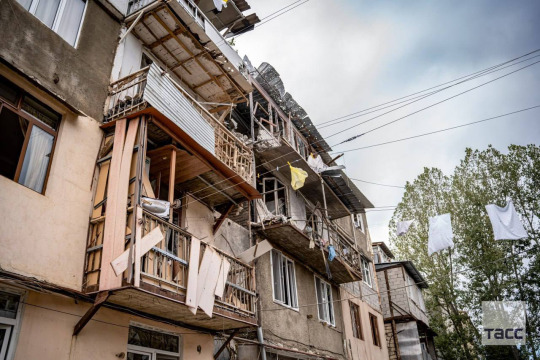
this is how Stepanakert, capital of Artsakh, looks right now. Bombing civilians is what the "restoration of the constitutional order" looks like for Aliyev? And the Armenian government chooses to do nothing and leave its people in danger
#rb this if you can#so that at least people not from Armenia will know about what is happening now#armenia#azerbaijan#war#stop war#nagorno karabakh#artsakh#armenian genocide#news#USA#russia#politics#nagorny karabakh
48 notes
·
View notes
Text
1992- Battle of Shusha
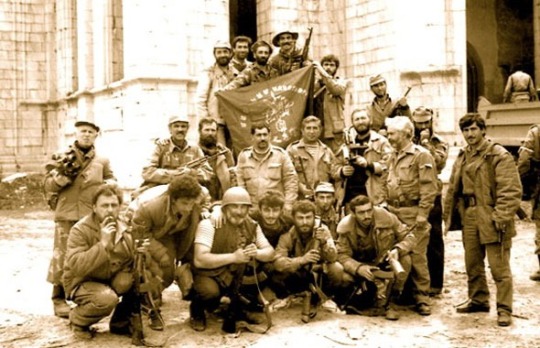
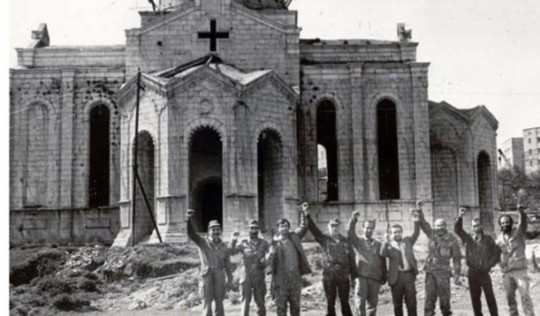
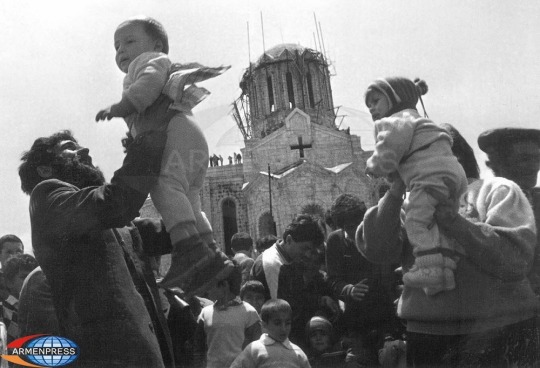
The Battle of Shusha (Armenian: Shushi)[a] was the first significant military victory by Armenian forces during the First Nagorno-Karabakh War. The battle took place in the strategically important mountain town of Shusha on the evening of May 8, 1992, and fighting swiftly concluded the next day after Armenian forces captured it and drove out the defending Azerbaijanis.
2 notes
·
View notes
Text

Azeri reinforced MT-LB APC during the First Nagorno-Karabakh War, 1988–1994
14 notes
·
View notes
